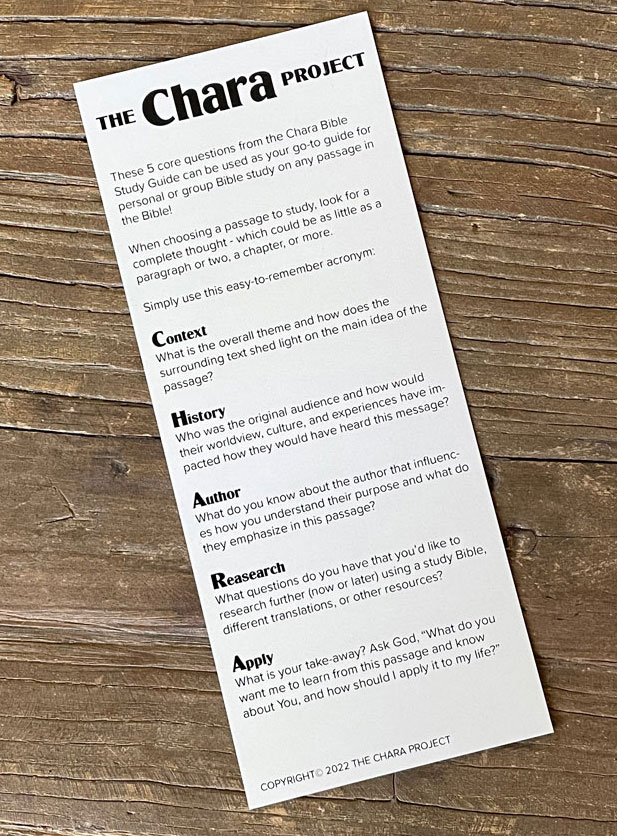“We know that all things work together for the good of those who love God, who are called according to his purpose.” (CSB)
Welcome to the Bible Study Guide for Romans 8:28, which leverages questions from the CHARA Bible Study Guide when studying this verse. Below are the questions the Chara team chose to ask, in the order they chose to ask them, but feel free to use other questions or change up the order as you dive into this passage. For ANSWERS from the Chara team on these questions, check out the video below.
RESEARCH
Observations & Questions: What observations or questions do you have when you reread Romans 8:28 more than once? Questions you may consider are “Who does this verse apply to?” (Hint: we find the answer to that question within the verse itself) “What does ‘all things’ mean?” or “How is ‘good’ defined/Who gets to define good?”
CONTEXT
Immediate: What is the theme or main idea found in the surrounding paragraph(s) and how does it give us more clarity on understanding who this verse applies to? (Hint: Read Romans 8:1-16 to learn more about “those who love God” mentioned in Romans 8:28)
AUTHOR
Related Text: What is revealed through Compare and Contrast in Romans 8:1-16 around living in the Spirit versus flesh?
APPLY
Yield: What personal, cultural, or religious bias and assumptions do you bring to Romans 8:28? For example: When we hear “all things work together for good” we may assume that ALL things should be good – our material possessions, our health, our life – if we love God.
CONTEXT
Immediate: What is the main idea found in Romans 8:17-18 and how does that help you determine what “all things” means? ? Notice the relationship between sharing in Christ’s glory and suffering. How does that provide clarity on what’s included in “all things”?
Bible: Does my interpretation hold true throughout the rest of the Bible? Do we see this relationship between suffering and glory anywhere else in the Bible? As a Christ follower, should you expect “all things” in your life to be good? (Hint: Check out cross references and Study Bible notes, which should lead you to verses like 1 Peter 4:12-13 and John 15:20, 16:33).
AUTHOR
Patterns: What is highlighted through the use of repetition in Romans 8:17-27? (Hint: Notice words like “waiting” or “hoping” to see how the author Paul is creating a sense of eagerness to have full rights as God’s adopted children and the glory that will be revealed to us later.) How does seeing this repetition help you understand what could be considered “good” in Romans 8:28?
CONTEXT
Immediate: What is the theme or main idea found in Romans 8:27-29? Who is the emphasis on in the verses immediately before and after Romans 8:28– us or God? Who’s in control? How does that provide clarity on who defines what is “good”?
AUTHOR
Speech: What point is Paul trying to make by asking four rhetorical questions in a row in verses 31-35?
How do verses 28-39 help you further define what is “good”?
RESEARCH
Resources: What insights do you learn from Biblical scholars provided in Study Bibles, commentaries, and credible online resources?
Paraphrase: How would you rewrite the message of Romans 8:28 into your own words? It may help to first summarize the understanding you’ve gained to the original questions:
1. Who does this verse apply to?
2. What does “all things” mean?
3. How is “good” defined/Who gets to define good?
APPLY
Yield: Based on the bias and assumptions we brought into Romans 8:28, what do you need to surrender, if anything, to be in harmony with the Bible? For example, if we love God, our desires and will should align to God’s will, and our definition of “good” changes. Are you ready to surrender your definition of “all things” and “good” when it comes to Romans 8:28?
Pray: Lord, what do you want me to learn? How should I apply this to my life?


